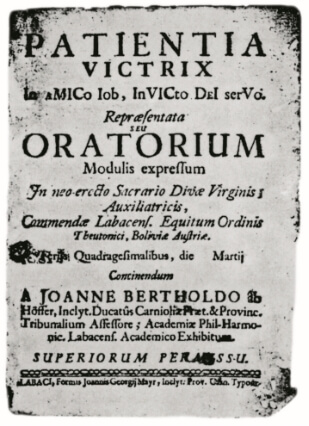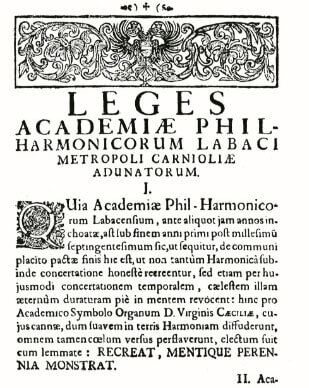Academia philharmonicorum
Towards the end of 1701, a group of like-minded men gathered at the home of patrician Janez Bertold von Höffer and decided to establish the Ljubljana Academia Philharmonicorum, following the model of similar societies in nearby Italy. Its duties and mission were described in the Statutes of the Philharmonic Academy – LEGES – and for its emblem the organ of St Cecilia, its patroness, was chosen.
The annual duty of the members was to celebrate the festive day of St Cecilia. They were also to provide honourable funeral services (requiems) for deceased members. Their activities were twofold: closed sessions (attended by members only) and public performances, the latter of which took place only on special occasions, such as various solemn events related to the ruling dynasty.
The members of the Academy entertained, amongst others, distinguished guests during their state visits to Ljubljana and regularly participated in high masses at the foremost churches of the town.
The annual regatta on the Ljubljanica River was a popular social event in Ljubljana for centuries: “The Academy, consisting of the gentlemen belonging to the Philharmonic, appeared for the first time, with fireworks. The whole town turned out and all of the boats had been hired, so that in the end they ran out and some people were unable to take part.”
The Academia Philharmonicorum Labacensium seems to have been particularly active in the first two decades of its existence. Over the years, Ljubljana’s Academia Philharmonicorum received a considerable amount of attention in Slovenian specialist literature.
Thanks to the chronicles by Janez Dolničar (in German, Thalnitscher, 1655–1719) Annales urbis Labacensis and Epitome chronologica, as well as the 1767 report by Karl Seyfried Perizhofer, written for the provincial charity commission, all of the most important performances by Academy are known.
The first public appearance of the Academia is supposed to have taken place at the Bishop’s mansion on 13 December 1701. However, Dolničar states in his Annales that the “gentlemen musicians” had in fact already performed in Höffer’s apartment on 1 March 1700.
Undoubtedly, the activities of the Academia Philharmonicorum significantly enriched musical life in Ljubljana and, above all, laid new foundations for its development. Music became an aristocratic pastime, thus raising its reputation and status in the city.
Even when the supporting pillars of the Academia Philharmonicorum were gone its memory lived on. Without the Academy’s example the Philharmonic Society could not have been founded in 1794. This, too, was one of the first such associations in Europe. Both of these institutions, each in harmony with its time, marked Ljubljana as a town of music, creating the tradition we are justifiably still proud of today.
The last evidence of the formal existence of the Academia Philharmonicorum dates from 1779.

The statutes of the Philharmonic Academy meeting in Ljubljana, the capital of Carniola
I. The purpose of the Philharmonic Academy of Ljubljana, which was first mooted some years ago, and was founded, as stated below, by common consent towards the end of the first year after seventeen hundred, is not only that its members will from time to time entertain themselves decorously with harmonious playing, but also that they will occasionally recall to their minds the celestial music of eternity. That is why the organ of the celestial virgin CECILIA, the pipes of which spread utterly sweet harmony all over the earth while raising everyone to the heavens, has been chosen as the Academy’s emblem, with the motto: IT ENTERTAINS, AND REVEALS ETERNAL THINGS TO THE MIND.
II. Although until now this Academy has admitted to membership only professional musicians, it has been decided that in future others, too, may join: namely amateurs of music, since these may be included as well under the general description of ‘lovers of harmony’. However, there shall never be more than 31 members of the Academy unless the Director and the Board of Management decide unanimously that this number may be increased.
III. Any person wishing to become a new member of the Academy may be admitted only on the basis of a decision taken unanimously by the Director and the Board of Management. The difference regarding professional and amateur musicans shall be that before being admitted the latter must fulfil the conditions set by the Academy’s Board of Management.
IV. On 22 November of every year, all members shall celebrate with maximum solemnity the feast of the celestial Virgin CECILIA, chosen as the patroness of this Academy: her picture should be displayed on a high altar; on this day, in the morning, a sung Mass shall be celebrated; and in the afternoon, exactly as on the day before, the Vespers or Litanies shall be performed. Moreover, on the feast of the celestial Virgin, our patroness, at least thirty Masses for the happy last hour and final grace of the living members shall be said during the sacred singing; the costs of this shall be borne each year by the Treasury.
V. If a member dies, three days after his relatives have finished their three-day mourning rites, the Academy should organise its own ceremony of mourning, at which all living members shall be present, if possible. Each of them shall make sure to be present for at least three Masses said for the departed. As regards the appropriate ceremony, the following shall apply: for each deceased member a catafalque of mourning, decorated with symbols and a sufficient number of wax candles, shall be erected. At the high altar a High Mass shall be celebrated, and in the mean time the choir shall sing a Requiem and laments. Simultaneously, at the lateral altars at least thirty Masses for the peace of the deceased member’s soul shall be said.
VI. For this reason, every member of the Academy, as soon as he learns of the death of a fellow member, shall immediately notify the Academy’s Board of Management, so that it will be possible to determine the place, day and hour of the appropriate solemn ceremony and also to inform the other members of it.
VII. Since, in view of the activities mentioned above, it is necessary to draw considerable sums from the Treasury of the Academy, each member shall contribute to it at least two florins a year.
VIII. The Academy’s Board of Management, consisting of the Director and Deputy-Director (both of whom must be able to lead both the choir and the Academy itself), the senior members, the Treasurer, and the Secretary, shall be reconstituted every year, on the first day following the feast of the celestial Virgin CECILIA, in the house of the outgoing Director.
To the glory of GOD and in honour of the celestial Virgin CECILIA, the patroness of the Academy. In the year 1701.
translated by Mateo Zore and Michael Talbot
